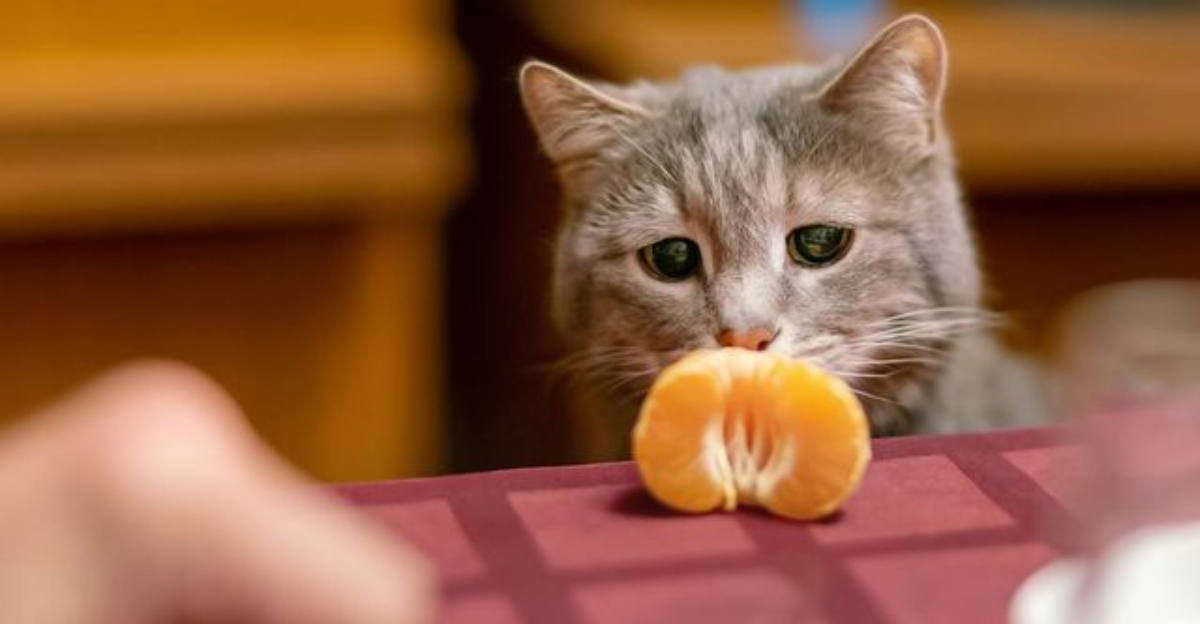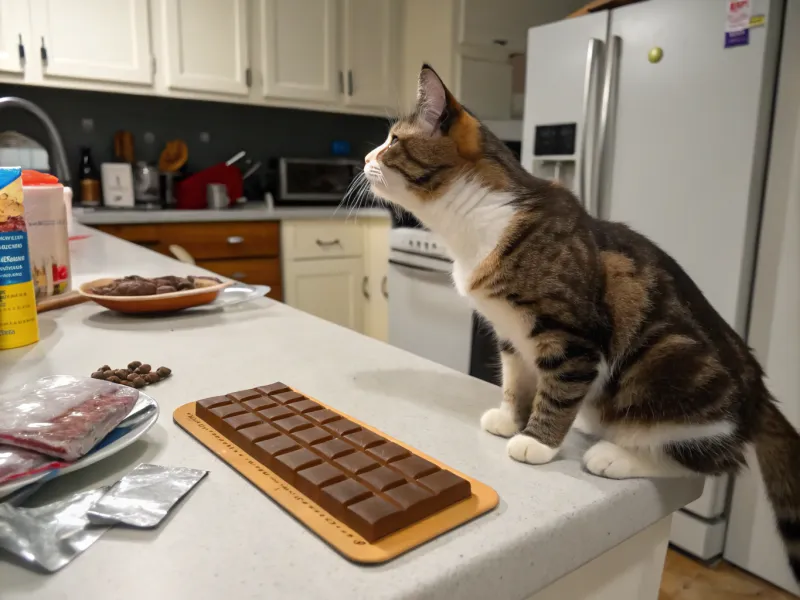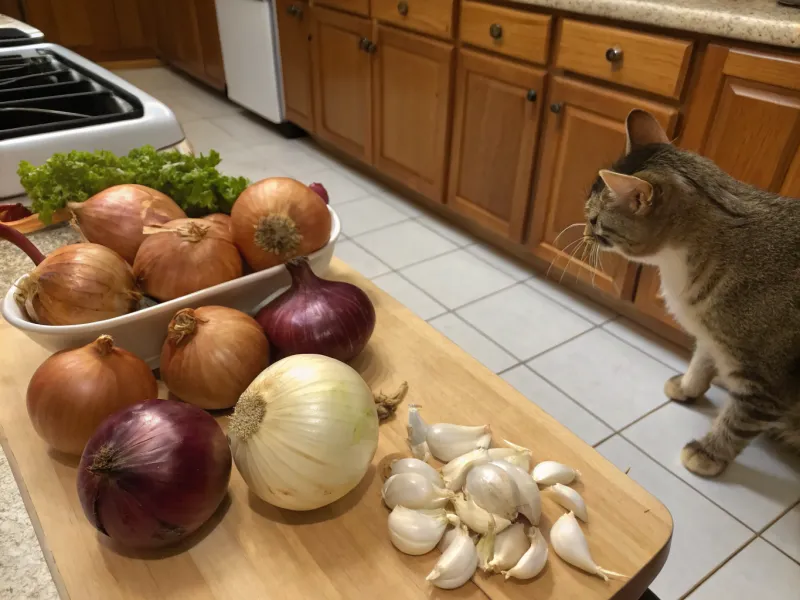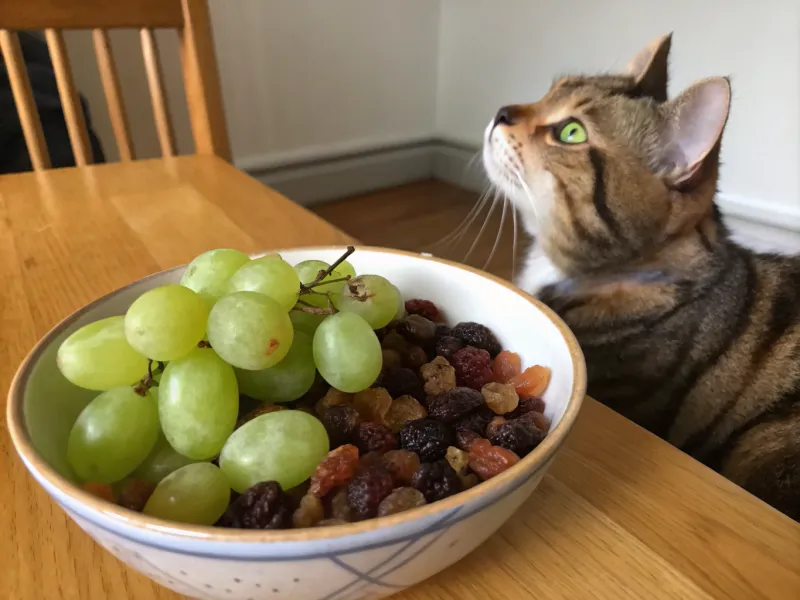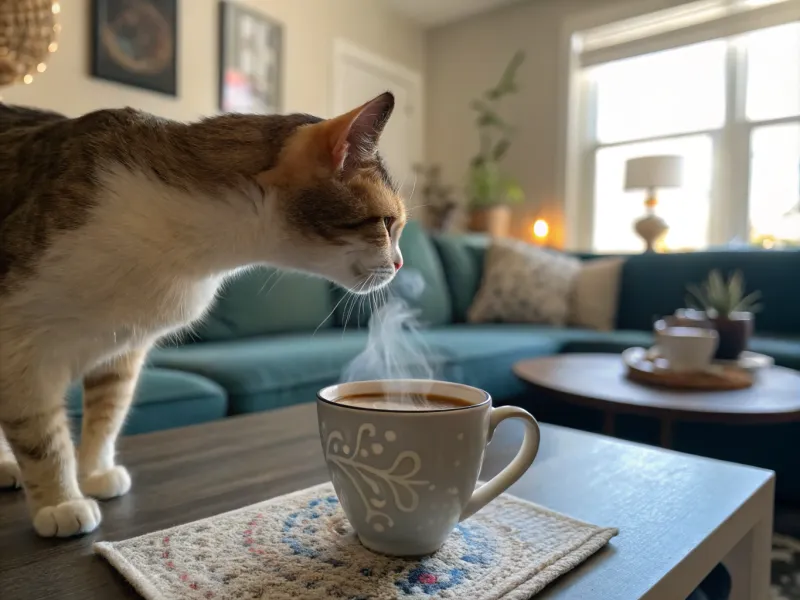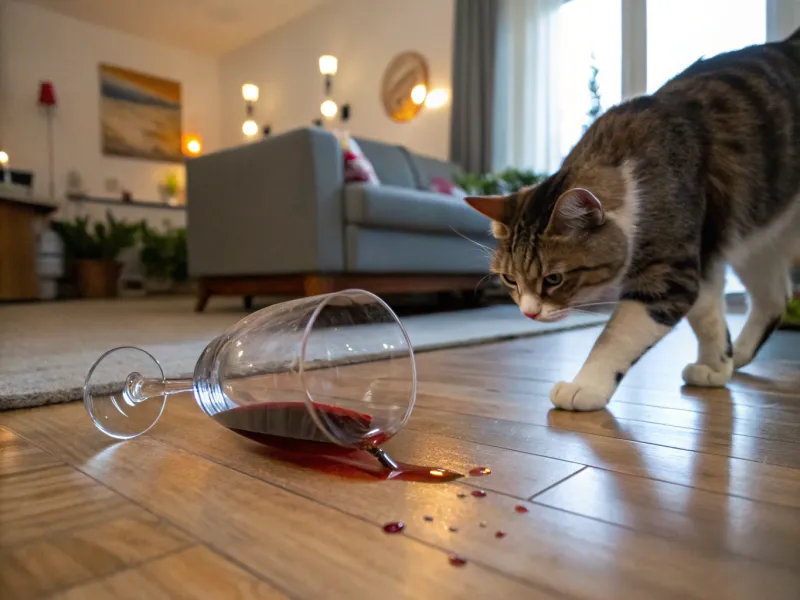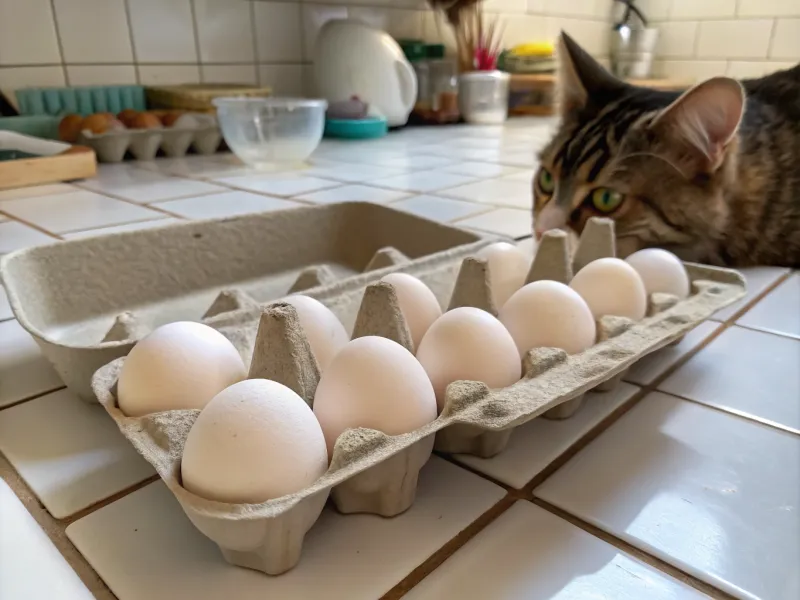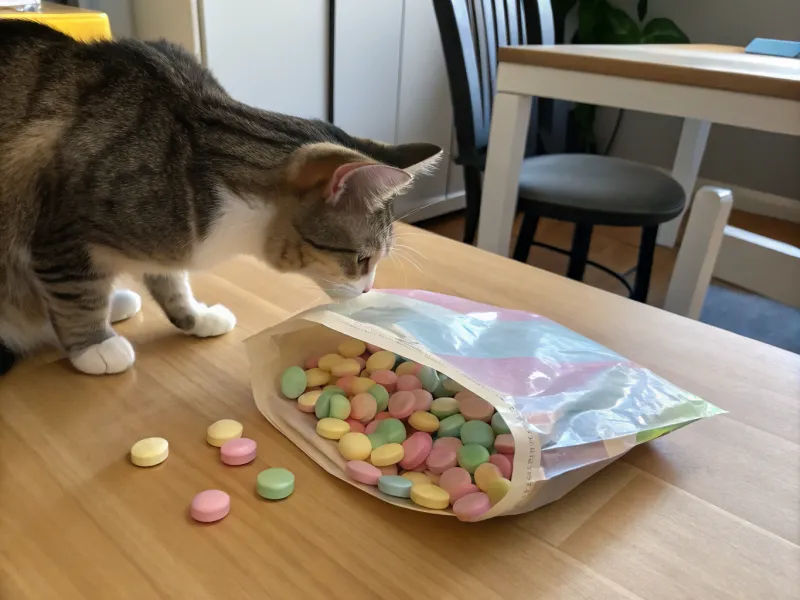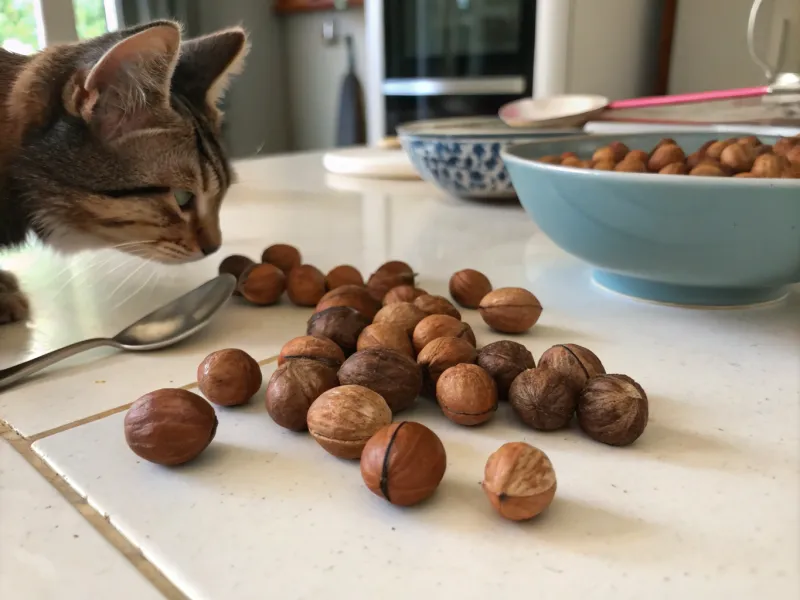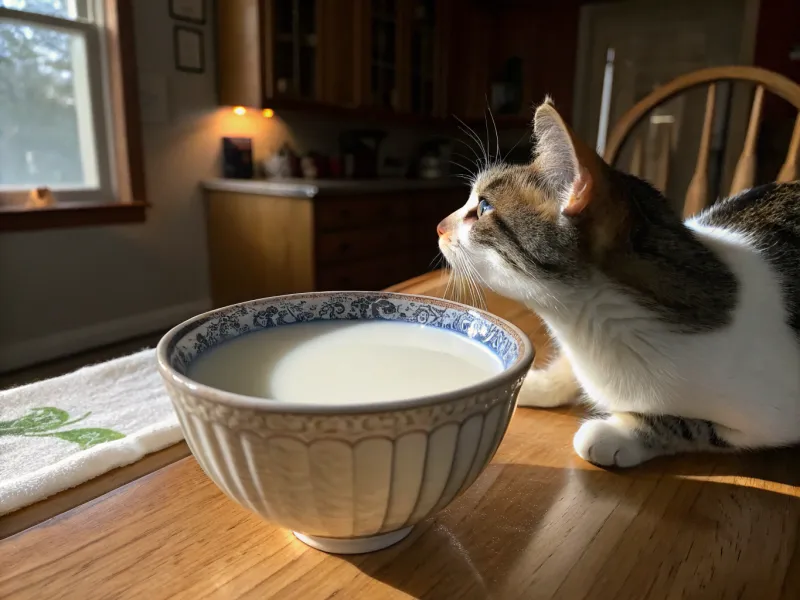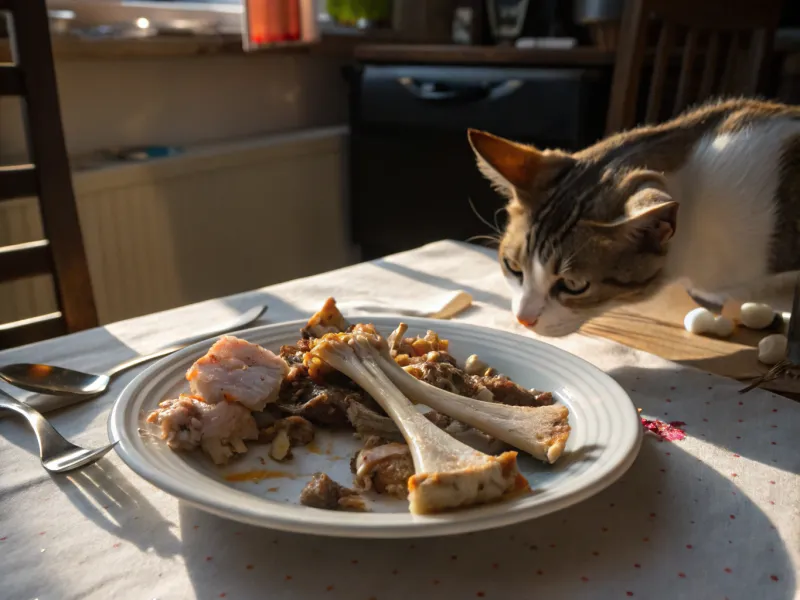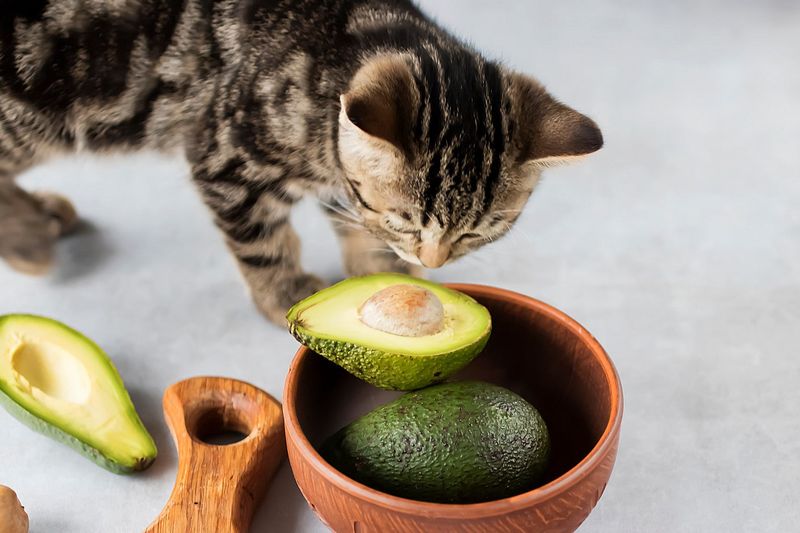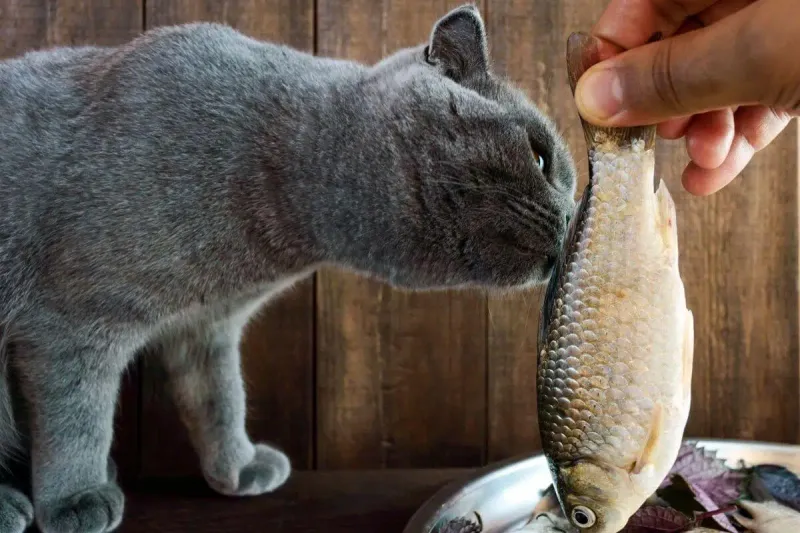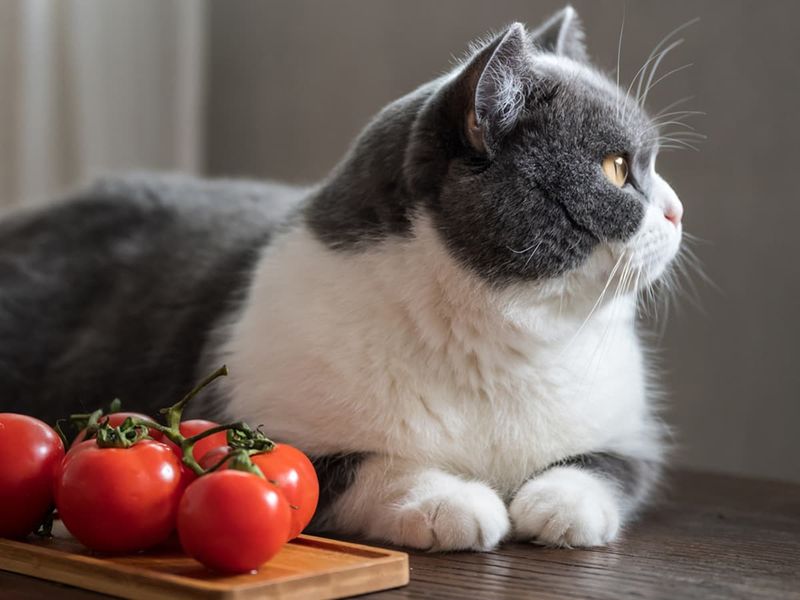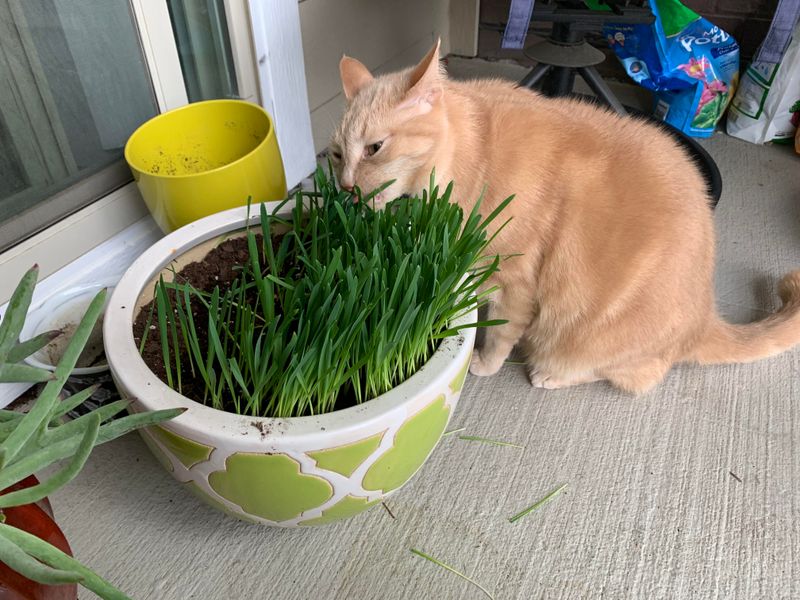📖 Table of Content:
Cats are naturally curious animals, constantly exploring their surroundings and investigating new smells and tastes. This curiosity can sometimes lead them to nibble on things that harm their health. Owners must stay vigilant to ensure their cats avoid these dangerous foods.
Certain foods, which may seem harmless to humans, can be toxic to cats. These items can cause severe reactions, ranging from mild stomach upset to life-threatening conditions. It’s important to recognize the common dangers that can lurk in your kitchen or dining area.
Cat owners can protect their pets from unnecessary harm by knowing which foods to avoid. A few simple precautions can make a significant difference in maintaining their health and well-being. Keeping these harmful items out of reach is key to ensuring a long, happy life for your feline companion.
1. Chocolate
Cats are highly sensitive to theobromine, a compound in chocolate, which can be deadly even in small amounts. Symptoms like vomiting, diarrhea, and seizures may occur, with dark chocolate being especially hazardous due to its higher cocoa content. If consumed, quick action is necessary, so contacting a veterinarian is critical.
Cats tend to avoid chocolate due to its bitterness, but accidental consumption is still possible. Always store chocolate in cat-proof containers or high shelves. Educate family members and guests about the potential dangers of sharing chocolate treats with felines.
2. Onions and Garlic
Onions and garlic, whether raw, cooked, or powdered, contain compounds that can damage a cat’s red blood cells. This can lead to anemia, lethargy, and weakness. The symptoms might not appear immediately, and they can develop over several days.
If your cat ingests onion or garlic, monitor for signs like pale gums, fatigue, or decreased appetite. Immediate veterinary care can prevent severe complications. It’s best to avoid feeding your cat any foods seasoned with these ingredients and ensure they don’t access leftovers that might contain them.
3. Grapes and Raisins
Eating grapes or raisins can lead to kidney failure in cats, though the exact toxin is still unknown. Even a tiny portion can trigger a harmful reaction. Common signs include vomiting, diarrhea, and lethargy, usually appearing within 12 hours.
In severe cases, cats may exhibit decreased urination, which can be life-threatening. Keeping grapes and raisins out of your cat’s diet is crucial, including foods that may contain them, like baked goods. If you suspect your cat has eaten grapes or raisins, seek veterinary assistance right away.
4. Caffeine
Found in coffee, tea, energy drinks, and certain medications, caffeine is a potent stimulant that is extremely toxic to cats. Just a small amount can cause restlessness, rapid breathing, tremors, and heart palpitations. If consumed in larger quantities, it can lead to seizures or even death.
Cats may be attracted to the milk in coffee or the sugar in caffeinated beverages but must be kept away from these items. Ensure caffeinated products are stored safely, and spills are cleaned immediately. Alertness to these dangers can prevent accidental consumption.
5. Alcohol
Ingesting alcohol, commonly found in drinks, cleaning agents, and certain foods, can lead to ethanol poisoning in cats. Even a small amount may cause vomiting, diarrhea, and confusion. In extreme cases, alcohol can cause respiratory failure or even death.
Always clean spills promptly and store alcoholic beverages and products out of reach. This precaution should extend to food items containing alcohol, ensuring that they are not accessible to your feline companions.
6. Raw Eggs
Certain foods, when consumed uncooked, carry bacteria like Salmonella and E. Coli, which can upset your cat’s digestive system. Egg whites, in particular, contain avidin, a substance that prevents biotin from being absorbed, leading to skin and coat problems.
Symptoms of bacterial infection include vomiting, diarrhea, and lethargy, which can be particularly severe in kittens or older cats. While some pet owners advocate for raw diets, it’s crucial to weigh the risks. If feeding eggs, ensure they are fully cooked. This simple precaution can significantly reduce health hazards associated with raw consumption.
7. Xylitol
Xylitol, a sugar substitute found in many sugar-free products, can cause a dangerous insulin release in cats. This leads to hypoglycemia, characterized by weakness, vomiting, and seizures. Severe cases may result in liver failure or even death.
It’s primarily found in gum, candies, and some baked goods, making it crucial to keep these items secured. Always read labels thoroughly to prevent accidental exposure. Educating household members about the risks associated with xylitol can help keep your cat safe from this hidden danger lurking in everyday products.
8. Macadamia Nuts
Even small amounts of macadamia nuts can be deadly to cats, with the exact toxin still unknown. Symptoms include vomiting, increased body temperature, and lethargy, while some cats may also suffer from muscle tremors and stiffness. These signs typically develop within 12 hours and may last for up to two days.
Despite being a common ingredient in baked goods and snacks, macadamia nuts should be kept out of your cat’s reach. It’s important to educate everyone in the household, including guests, about the dangers of feeding cats foods containing these nuts.
9. Dairy Products
Many cats are lactose intolerant, so consuming dairy can lead to digestive issues like diarrhea and stomach upset. While kittens can digest their mother’s milk, adults often lose this ability. The symptoms of lactose intolerance may include bloating and gas, which can be uncomfortable for your pet.
Alternative milk products, such as those specifically designed for cats, might be better options. If you suspect your cat is suffering from dairy-related issues, consult with a veterinarian. They can provide guidance on suitable dietary changes to keep your cat healthy.
10. Bones and Fat Trimmings
Bones and fat trimmings may seem like a natural treat for cats, but they pose significant health risks. Bones can splinter and cause choking or internal injuries. Fat trimmings can lead to pancreatitis, a painful and potentially life-threatening condition.
Symptoms include vomiting, lethargy, and abdominal pain. It’s essential to dispose of bones and fat scraps securely, ensuring they are out of your cat’s reach. Instead of feeding table scraps, provide your cat with safe and nutritionally balanced treats. Regular vet check-ups can help monitor your cat’s digestive health.
11. Avocado
Though avocados are a popular health food for people, they are not suitable for cats. The fruit contains persin, a toxin that can be harmful to cats, causing gastrointestinal distress like vomiting and diarrhea. Additionally, the high-fat content of avocados may contribute to the development of pancreatitis.
Ensure avocados, and guacamole, are out of your cat’s reach. If you suspect your cat has consumed avocado, it’s wise to consult a veterinarian promptly to rule out any adverse effects.
12. Raw Fish
Feeding raw fish to your cat might seem natural, but it poses several risks. Raw fish can harbor bacteria like Salmonella or E. coli, which can cause severe digestive issues. Moreover, certain raw fish contain an enzyme that destroys thiamine, an essential B vitamin for cats. Thiamine deficiency can lead to neurological problems and even life-threatening complications.
Opt for cooked fish instead, ensuring all bones are removed. This way, your cat can enjoy the benefits of fish without the associated dangers of raw consumption.
13. Citrus Fruits
Oranges, lemons, and limes, rich in citric acid and essential oils, can upset your cat’s stomach. Even a small bite can lead to vomiting, diarrhea, or general digestive discomfort. Although cats tend to dislike the smell of citrus, it’s best to keep these fruits well away from them.
Avoid using citrus-based cleaners on surfaces your cat frequents to prevent accidental ingestion and ensure their well-being.
14. Tomatoes
While ripe tomatoes are less harmful, unripe tomatoes and the plant itself contain solanine, a toxic substance for cats. Ingestion can cause stomach upset, lethargy, and increased heart rate. The leaves and stems are particularly dangerous, so it’s vital to keep them away from curious paws.
If you grow tomatoes at home, ensure your cat cannot access the plants. This precaution helps prevent any accidental consumption of the toxic parts.
15. Chives
Chives, those delicate green stalks often used to flavor human dishes, may seem innocuous but can pose a real threat to cats. These members of the allium family, which also includes onions and garlic, contain compounds that can damage red blood cells in our feline friends, potentially leading to anemia.
While a small nibble might not cause noticeable harm, substantial consumption could result in digestive upset or more severe symptoms like lethargy and weakness. If you suspect your cat has ingested chives, it’s best to consult your veterinarian promptly. Keeping dishes containing chives away from your cat’s curious paws is wise.
